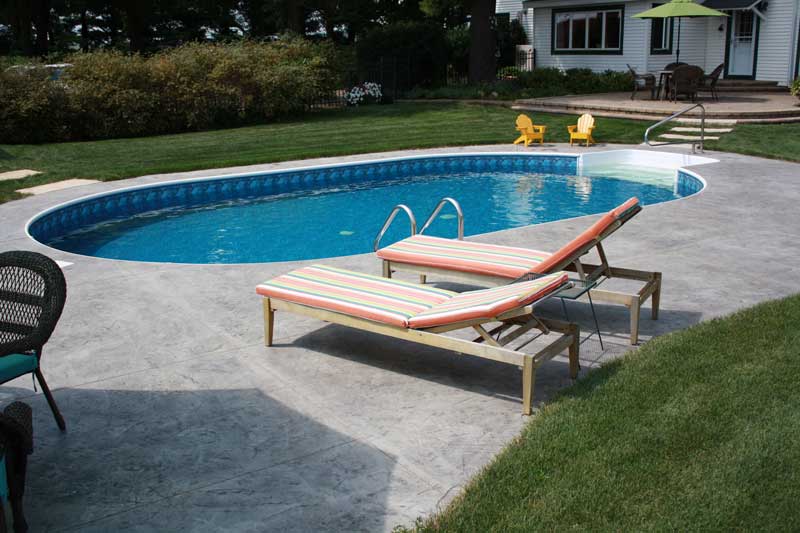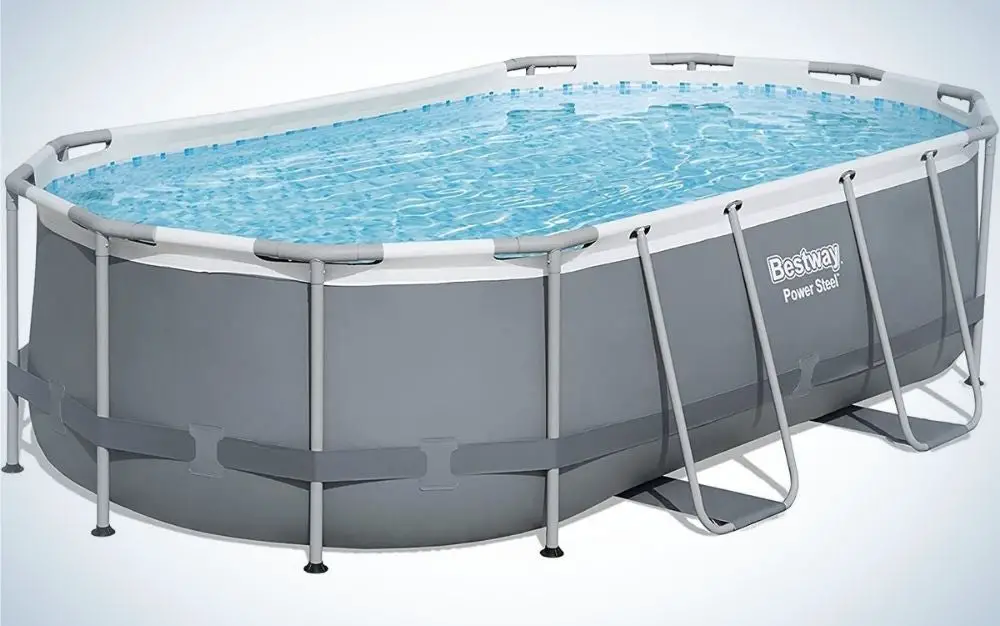Optimum pools are vinyl-liner pools, while radiant pools are made with a combination of materials. In terms of their construction, optimum and radiant pools are two very different options for swimming pool owners.
Optimum pools are made with a steel frame and come in a variety of shapes and sizes. These pools are then fitted with a vinyl liner to hold water. Radiant pools, on the other hand, are made with a combination of materials, including resin, aluminum, and steel. This hybrid construction gives radiant pools added durability and resistance to wear and tear. Furthermore, radiant pools are designed with a thermal wall technology that reflects heat back into the pool, making them an energy-efficient option for homeowners. Both optimum and radiant pools have their benefits and drawbacks, and finding the right choice for your backyard will depend on a variety of factors.

Credit: www.swimmingpool.com
A Brief Introduction To Optimum Pool And Radiant Pool
Optimum pool and radiant pool are two different types of pools designed to cater to different consumer needs. Optimum pool is an affordable inground pool that is easy to install and maintain. It comes in different sizes and shapes to fit any backyard space.
On the other hand, radiant pool is a more energy-efficient, durable and versatile option. It comes with insulated walls, making it suitable for year-round swimming in colder regions. Additionally, radiant pools offer various customization options like deck and fence options.
Knowing the differences between these two pools can help you decide which one best suits your preferences and needs.
1. Design And Construction
Optimum pool and radiant pool have different design and construction features to meet your pool needs. Optimum pool has a custom design with endless shapes and sizes to choose from based on your preference. Radiant pool has a standard rectangular shape that is easy to install.
Both pools are built with durability in mind, but optimum pool has an advantage, as it is built with multiple layers of fiberglass. Radiant pool is made with aluminum panels and has a built-in thermal barrier. Quality construction is important in ensuring longevity, longevity and reliability, and both pools have a great reputation in that regard.
Consider the design and construction of each pool carefully before making your decision.
Product Talk Radiant Pool Sides
2. Maintenance And Durability
Optimum pool and radiant pool are two excellent options for any pool lover. When it comes to maintenance, however, the two differ in a number of ways. Optimum pools require minimal maintenance and are very durable. Radiant pools, on the other hand, are also durable, but they require more maintenance.
That’s not to say they aren’t easy to maintain, though. In fact, they’re both pretty easy to maintain. Ultimately, the decision on which one is easier to maintain will depend on your individual needs and preferences. Regardless of what you choose, you’ll have a pool that can last for years to come, with proper care and maintenance.
3. Features And Benefits
Optimum pools are made with high-quality materials designed to withstand harsh weather conditions. The pool walls are crafted with heavy-duty aluminum insulated panels and coated with a scratch-resistant finish. Radiant pools are also durable, constructed with hybrid aluminum walls and a steel frame.
The walls are coated with a layer of epoxy resin to prevent rust and corrosion. Optimum pools offer a customizable design, with options to include built-in stairs and benches. Radiant pools come in two shapes, round and oval, and offer a variety of sizes.
Both pools provide eco-friendly options for heating and filtration. Overall, optimum pools may be the better choice for those looking for a fully customizable pool, while radiant pools are a great option for those seeking durability and simplicity.
4. Cost Analysis
Analysis of the cost involved in choosing between optimum pool and radiant pool is crucial. When it comes to price consideration, optimum pool is a cheaper option due to lower installation costs. However, it is important to identify hidden costs such as maintenance and repairs over time.
Radiant pool, on the other hand, costs more upfront but is durable, reducing maintenance and repair costs in the long run. In addition, it adds to the overall value of the property. Therefore, radiant pool is a better value for money in terms of the total cost of ownership.
When choosing between the two, it is important to consider the upfront and ongoing costs as well as the long-term value of the investment.
5. Customer Reviews And Satisfaction
Comparing customer reviews and satisfaction of optimum pool and radiant poolboth optimum pool and radiant pool are popular choices for homeowners, but how do they compare in terms of customer satisfaction? According to customer reviews, radiant pool has received a slightly higher rating than optimum pool.
Some common complaints with optimum pool include liner issues and installation problems. Meanwhile, radiant pool’s main issue seems to be with their customer service. Despite this, many customers claim that they are happy with both their optimum and radiant pools.
At the end of the day, it ultimately comes down to your personal preferences and needs when choosing between the two. However, it’s always a good idea to take customer feedback into consideration before making a final decision.
Frequently Asked Questions For Optimum Pool Vs Radiant Pool
Faqs:
### 1. What is the maximum lifespan of an optimum pool?
2. How Does A Radiant Pool Differ From An Optimum Pool?
A radiant pool is made of insulated walls and has a longer lifespan. It also requires less maintenance and saves on energy bills.
3. How Long Does It Take To Install An Optimum Pool?
The installation of an optimum pool can take anywhere from 3-6 weeks, depending on the size of the pool and any custom features.
4. What Is The Upfront Cost Difference Between A Radiant Pool And An Optimum Pool?
A radiant pool may have a higher upfront cost due to its insulated walls, but it can save money in the long term on maintenance and energy bills.
Conclusion
The decision between optimum pool and radiant pool ultimately boils down to personal preferences and needs. Optimum pool may be the better option for those seeking a more affordable and easier installation process. However, if you’re looking for a more robust pool that can withstand harsh weather conditions and last longer, radiant pool may be the way to go.
Both pools come with their own unique features and advantages, but it’s important to carefully consider your specific needs before making a decision. Regardless of which pool you choose, maintaining your investment by cleaning and servicing it regularly is the key to ensuring its longevity.
With the right care, your pool can provide your family with countless years of enjoyment and relaxation.
